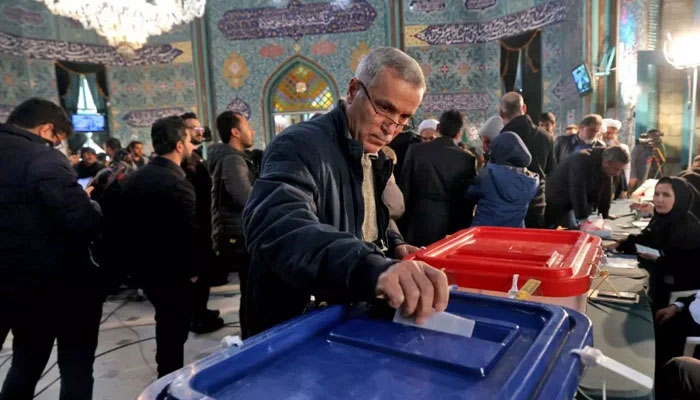‘Social media changing electoral trend in Iran’
When asked about the future of reformist front, Mirzaei reasoned that reformists were still a powerful minority within the Parliament
Islamabad:The current pattern of conservatism and reformism would change in Iran, said Pooya Mirzaei, editor-in-chief, Political Economy Journal, Tehran. Mirzaei was speaking at an event hosted here by Institute of Regional Studies (IRS).
Mirzaei observed that the Middle East, West Asia and South Asia did not have any record of holding elections prior to the arrival of western culture. While the civilisation of this region was much older than the western one, the concept of democracy actually prevailed in the West, he added. While analysing the low voters’ turn out in the elections, he argued that lack of voters’ participation did not mean the opposition to the system. In fact, many countries in the West had much less voters’ participation, opined. He further alluded to the fact that opposition of Iran mainly resided outside of the country.
When asked about the future of reformist front, Mirzaei reasoned that reformists were still a powerful minority within the Parliament. He also mentioned that unlike the popular narrative, Supreme Leader seat in Iran was not an unelected post, instead, the leader was elected through the Assembly of Experts who contested elections every eight years through city councils. In this sense, the system of Iran was quite similar to the electoral systems of France and the US, Mirzaei claimed.
Fraz Naqvi of IRS said that elections in Iran reflected the divisions within the conservative camp as four separate coalitions of conservative faction came at top. He further argued that the differences within the Iranian coalitions were not the manifestation of deep-rooted disagreements that could disrupt the state’s system, instead they were reflective of Iran’s vibrant electoral culture. While concluding, Naqvi predicted that these elections would prove crucial for the upcoming presidential elections in Iran in 2025.
-
 Prince William Closes Saudi Arabia Visit With Rare Desert Shot
Prince William Closes Saudi Arabia Visit With Rare Desert Shot -
 'King Charles Acts Fast Or Existential Crisis' Over Andrew Scandal
'King Charles Acts Fast Or Existential Crisis' Over Andrew Scandal -
 Brooklyn Beckham Charging Nearly £300 In Ticket Cost For Burger Festival
Brooklyn Beckham Charging Nearly £300 In Ticket Cost For Burger Festival -
 Prince William Makes Unexpected Stop At Local Market In Saudi Arabia
Prince William Makes Unexpected Stop At Local Market In Saudi Arabia -
 Zayn Malik Shares Important Update About His Love Life
Zayn Malik Shares Important Update About His Love Life -
 Kate Middleton, William Are Holding Onto Their Hats As Worse Gets Threatened: Behind The Veil Of Shame
Kate Middleton, William Are Holding Onto Their Hats As Worse Gets Threatened: Behind The Veil Of Shame -
 British Soap Awards Scrapped Again As ITV Confirms 2026 Hiatus
British Soap Awards Scrapped Again As ITV Confirms 2026 Hiatus -
 Climate Nearing Dangerous Tipping Points, Study Shows
Climate Nearing Dangerous Tipping Points, Study Shows -
 James Van Der Beek, 'Dawson's Creek' Star, Dies At 48
James Van Der Beek, 'Dawson's Creek' Star, Dies At 48 -
 Threads Launches Dear Algo AI Feature To Personalise Feeds In Real Time
Threads Launches Dear Algo AI Feature To Personalise Feeds In Real Time -
 Police Take Action Over Andrew's Ties With Jeffrey Epstein While In UK Office
Police Take Action Over Andrew's Ties With Jeffrey Epstein While In UK Office -
 Courtney Love Makes First Appearance Since New Report On Kurt Cobain's Death
Courtney Love Makes First Appearance Since New Report On Kurt Cobain's Death -
 King Charles Anxious As Uncertainty Grows Over Sarah Ferguson’s Next Move
King Charles Anxious As Uncertainty Grows Over Sarah Ferguson’s Next Move -
 Real Reason Kim Kardashian Is Dating Lewis Hamilton
Real Reason Kim Kardashian Is Dating Lewis Hamilton -
 Rihanna Leaves Elderly Woman Star-struck In Viral Grocery Store Video
Rihanna Leaves Elderly Woman Star-struck In Viral Grocery Store Video -
 TikTok US Launches Local Feed Using Precise Location Data
TikTok US Launches Local Feed Using Precise Location Data




